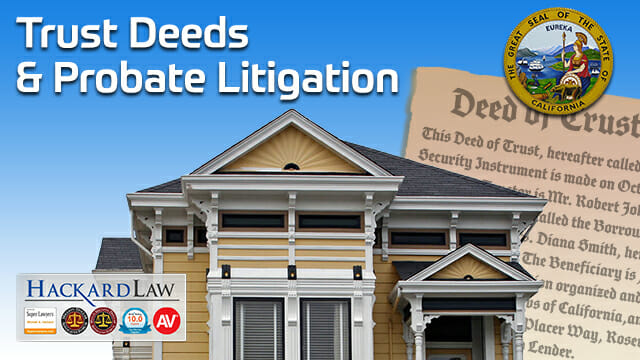
California Decedent’s Trust Deeds | What Do I Do Now?

California Decedent’s Trust Deeds | What Do I Do Now?
- October 24, 2016 - Trust Litigation,
The Consumer Financial Protection Bureau reports that 30% of homeowners 65 and older have mortgage debt. For those 75 and older, the rate is over 21%. A significant number of California trust and probate estates have mortgage debt. For those who administer such estates – trustees, administrators and executors – questions often arise as to whether the mortgage or trust deed may be assumed by a beneficiary, heir or trustee. These are important questions and the answers are impacted by a number of factors.
California home lenders and title companies secure borrower debts on real property by deeds of trusts (trust deeds). Such deeds of trust are usually on title company or institutional lender forms. A deed of trust includes three parties: A trustor – the full or partial owner of the real property; A trustee – a person or entity whose function is to reconvey the property to the trustor if the loan is repaid or to foreclose on the property if it is not; and the beneficiary – the person or entity to whom the debt is owed. When a trustee, administrator, executor, heir or beneficiary steps into the role previously held by the decedent on real property debt, the rights and obligations associated with the debt may be a little baffling. Federal law helps to clear up some of the cloudiness affecting debt obligations and estates.
In 1982 Congress passed the Garn-St. Germain Depository Institutions Act of 1982, (the “Garn-St. Germain Act”), legislation which addresses when a mortgage or deed of trust can and cannot be assumed by a new owner of the property. This is an important law for the protection of those who step into the shoes of a borrower after the borrower’s death.
We do estate litigation. It is in this role that we see a wide spectrum of circumstances following the death of a borrower. Common circumstances include an elderly mother’s death with a will, trust or even inheritance by intestacy that effectively leaves her home, encumbered by a deed of trust, to her two children. Can the children take over their mother’s low-interest loan or will the children have to pay the existing loan off and refinance if they want to keep the house? Does it make a difference whether they want to rent the house of occupy it themselves?
Similar issues arise when family members or investors hold real property in joint tenancy with right of survivorship. When a joint tenant dies owning real property secured by a deed of trust may the lender force a refinance or sale?
The Garn-St. Germain federal law prevents the lender, even with contractual due-on-sale rights, from forcing joint tenant heirs to payoff the indebtedness. Not all lenders are volunteer this limitation to surviving joint tenants.
Given the frequency with which California family members inherit real property subject to pre-existing deeds of trust, it is little wonder that such heirs have initial trepidation and uncertainty as to their rights.
It is a fundamental right of U.S. citizens to bequeath their property to others. The right of inheritance applies to all property, including even properties with deeds of trust attached to them. Assumption of obligations associated with the deeds of trust is of early concern after the death of the decedent.
Other than home exceptions for relatives and spouses noted in the Garn-St. Germain Act, almost no one else can assume an inherited property’s deed of trust. The reason non-related heirs and beneficiaries can’t just assume a decedent’s deed of trust relates to the fairly standard contractual due-on-sale clauses that are in most title company and institutional lender’s form trust deeds. Other than home exceptions for relatives and spouses, property inheritors generally need to make arrangements with the lenders to pay off those deeds of trust. Persons inheriting secured properties should work with the properties’ lenders to determine whether a refinance is possible or a sale is preferred.
If homes are over-encumbered, heirs or beneficiaries may refuse to accept the upside-down assets they would otherwise inherit. Since the heirs or beneficiaries are not the borrower, the heirs or beneficiaries’ credit is not affected.
The Garn-St. Germain Act carves out exceptions to secured loan due-on-sale clauses that would otherwise prohibit loan assumptions by inheritors of real property subject to deeds of trust.
If one joint tenant dies, the Garn-St. Germain Act prohibits the secured lender form enforcing the due on sale clause against the surviving joint tenant. This applies whether or not the joint tenants were relatives.
California “joint tenants,” whether spouses, relatives, friends, business partners, or life partners, get full ownership of the joint tenancy property by operation of law upon the death of the joint tenant. The property does not have to pass by probate. The secured obligation is intact and there is no change to its terms.
California spouses often purchase or encumber their real property with secured loans borrowed in their joint names. A surviving spouse owning her home jointly in a deed with rights of survivorship inherits her deceased spouse’s half of the home automatically at his death. The surviving spouse is still a borrower on the underlying secured loan and responsible for continuing to make the payments. However, federal law prohibits the lender from calling the underlying loan due because one spouse has passed away.
Lenders are generally aware of the federal regulations contained within the Garn-St. Germain Act and the federal preemption over contractual due-on-sale clauses. That said, surviving spouses should notify lenders of their intent to take over their deceased spouses’ loan.
When a relative inherits and occupies a residence, the Garn-St. Germain Act bars the lender from enforcing the due-on-sale clause. Relatives inheriting a home can inherit or assume its secured loan as long as they intend to live in it. However, the inheritance or assumption exception for relatives of deceased homeowners applies strictly to homes only. If the relative keeps mortgage obligations current and lives in the inherited home, the lender must permit loan assumption.
If the deceased borrower is behind on his or her payments at the time of death and foreclosure proceedings had commenced, then the person who is assuming the underlying loan will have to cure the default to stop the foreclosure. Relatives will need to make up payment arrears or enter into a repayment agreement with the lender.
Attorney Michael Hackard
 Michael Hackard is a top rated “AV” for over 20 years (“AV Preeminent is a significant rating accomplishment- a testament to the fact that a lawyer’s peers rank him or her at the highest level of professional excellence.”). Avvo also ranks him with their highest rating – “ 10.0 Rating – ‘Superb.’” Michael is also a “SuperLawyer” – an honor reserved for no more than five percent of attorneys in each state. [ Attorney Bio ]
Michael Hackard is a top rated “AV” for over 20 years (“AV Preeminent is a significant rating accomplishment- a testament to the fact that a lawyer’s peers rank him or her at the highest level of professional excellence.”). Avvo also ranks him with their highest rating – “ 10.0 Rating – ‘Superb.’” Michael is also a “SuperLawyer” – an honor reserved for no more than five percent of attorneys in each state. [ Attorney Bio ]
RECENT POSTS
- Estate Litigation and the Great Baby Boomer Wealth Transfer
- Understanding Traumatic Brain Injury: Common Types Resulting from Car Accidents
- Exceeding Expectations: How Our Contingency Fee Approach Benefits Estate, Trust, and Traumatic Brain Injury Clients
- Unlocking the Science: Factors Impacting Traumatic Brain Injury in Car Accidents Explained
- Key Factors in Assessing Sacramento Car Accident Severity
CATEGORIES
- Abused Beneficiaries
- Catastrophic Injury
- Celebrity Estate Battles
- Community
- Coronavirus Liability
- Dependent Adult Financial Abuse
- Elder Financial Abuse
- Estate Litigation
- Estate Planning
- Firm News
- Legal Advocacy
- Life Insurance Beneficiary Litigation
- Traumatic Brain Injury
- Trust Litigation
- Trusts Accounting
- Will Contests
- Wrongful Death

